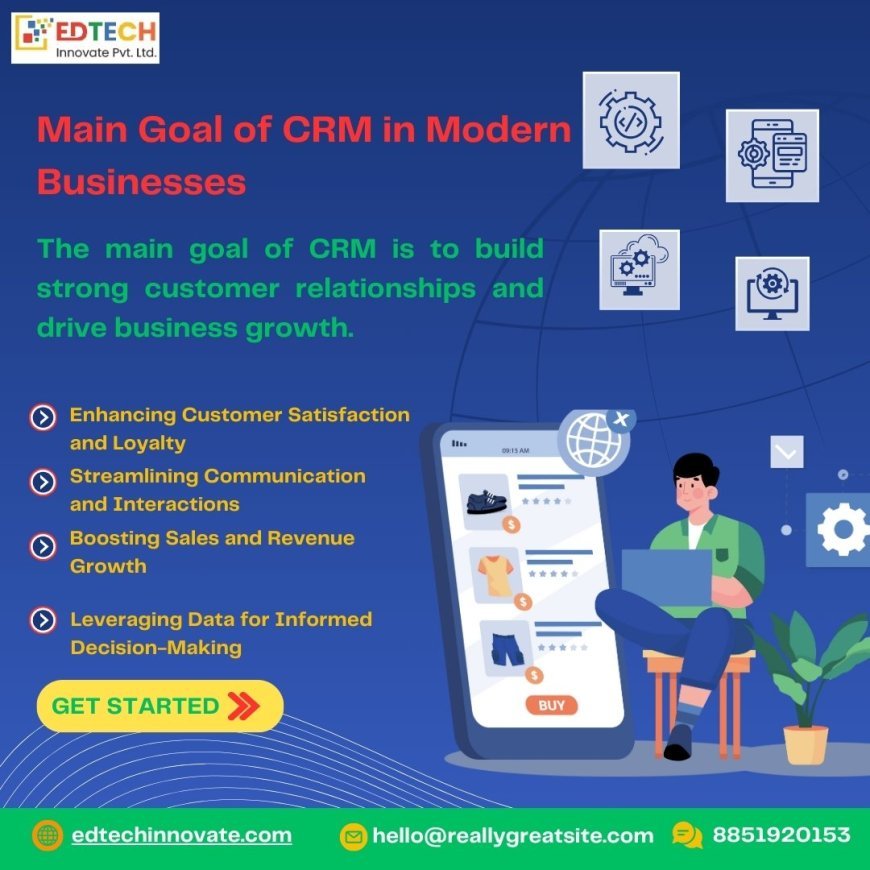Exploring the Future of CRM: Trends and Innovations

In the ever-changing world of business, the need to maintain strong relationships with customers has never been more critical. Customer Relationship Management (CRM) systems have become indispensable tools for businesses seeking to enhance customer interactions, boost retention, and drive revenue. But with the rapid evolution of technology, one may wonder: does CRM have a future? The answer is a resounding yes. CRM is not only evolving but also becoming more integral to business success.
In this article, we will explore the future of CRM, its significance for businesses, and how the best CRM system examples are shaping industries across the globe.
The Role of CRM in Modern Business
At its core, Customer Relationship Management is a strategy supported by technology that enables businesses to manage customer interactions and relationships. It centralizes customer data, streamlines communication, and provides valuable insights into customer behavior and preferences. This comprehensive approach empowers organizations to deliver personalized experiences, build loyalty, and optimize business operations.
CRM has already proven its worth, but its potential to revolutionize customer-centric business models remains immense. With advancements in artificial intelligence (AI), machine learning, and automation, CRM is poised to deliver even greater value in the future.
The Growing Importance of Customer-Centricity
Businesses today operate in a hyper-competitive and highly connected world. Customers have more choices than ever and expect seamless, personalized experiences at every touchpoint. CRM systems help businesses meet these expectations by providing tools to analyze customer data, predict behavior, and offer tailored solutions.
For example, businesses can use CRM to create targeted marketing campaigns based on customer segmentation, track sales leads, and provide proactive customer support. This level of personalization fosters trust and loyalty, ensuring customers remain engaged with the brand.
Future Trends in CRM
The future of CRM is shaped by emerging technologies and evolving customer expectations. Let’s examine some key trends that will define the next generation of CRM systems:
1. AI and Machine Learning Integration
Artificial intelligence and machine learning are transforming CRM systems by automating processes, enhancing decision-making, and improving customer experiences. AI-powered CRMs can analyze vast amounts of customer data to predict trends, identify opportunities, and recommend personalized actions.
For example, chatbots powered by AI can handle customer queries in real time, freeing up human agents to focus on more complex issues. Machine learning algorithms can also analyze purchasing patterns to recommend upsell or cross-sell opportunities.
2. Enhanced Mobile CRM
As mobile usage continues to rise, CRM systems are becoming more mobile-friendly. Mobile CRMs allow sales representatives and customer service teams to access critical customer information on the go. This flexibility ensures that businesses can maintain strong customer relationships, even in remote or on-the-move scenarios.
3. Data Privacy and Security
With the increasing reliance on customer data, privacy and security have become paramount. Future CRM systems will prioritize compliance with data protection regulations like GDPR and CCPA. Businesses will need to invest in secure CRMs that protect customer information while maintaining transparency.
4. IoT Integration
The Internet of Things (IoT) is creating new opportunities for businesses to connect with customers. By integrating IoT data into CRM systems, businesses can gain deeper insights into customer preferences and behavior. For instance, smart devices can provide real-time usage data, enabling companies to offer timely maintenance or upgrade suggestions.
5. Omnichannel Capabilities
Customers today interact with businesses across multiple channels, including email, social media, live chat, and in-person. Future CRM systems will provide seamless omnichannel capabilities, ensuring consistent communication and a unified customer experience across all platforms.
Best CRM System Examples for Businesses
Choosing the right CRM system is critical for businesses to leverage the full potential of CRM technology. Here are some of the best CRM system examples that cater to diverse business needs:
1. Edtech Innovate
2. HubSpot CRM
HubSpot CRM is an excellent choice for small and medium-sized businesses. It offers a user-friendly interface and integrates seamlessly with other HubSpot tools for marketing, sales, and customer service. The free version of HubSpot CRM makes it an attractive option for startups looking to get started with CRM.
3. Zoho CRM
Zoho CRM is known for its affordability and scalability, making it suitable for businesses of all sizes. It includes features such as sales automation, lead management, and analytics. Zoho’s AI assistant, Zia, helps users make informed decisions by analyzing customer data and providing recommendations.
4. Microsoft Dynamics 365
Microsoft Dynamics 365 combines CRM and enterprise resource planning (ERP) capabilities, making it a powerful tool for large enterprises. It integrates seamlessly with other Microsoft products like Office 365 and Power BI, enabling businesses to streamline operations and gain valuable insights.
5. Pipedrive
Pipedrive is a sales-focused CRM designed to help sales teams manage leads and close deals efficiently. Its intuitive interface and customizable pipelines make it a favorite among sales professionals. Pipedrive also offers automation features to reduce manual tasks.
6. Freshsales
Freshsales, part of the Freshworks suite, is a CRM system designed for businesses seeking simplicity and functionality. It includes features like lead scoring, email tracking, and AI-powered insights. Freshsales is particularly well-suited for small and medium-sized businesses.
Why CRM Will Continue to Thrive
The future of CRM is bright because of its adaptability and ability to evolve with changing business needs. Here are some reasons why CRM will continue to thrive:
1. Increasing Demand for Personalization
Customers today demand personalized experiences, and CRM systems are the backbone of delivering them. By analyzing customer data, businesses can create tailored marketing campaigns, recommend products, and provide proactive support.
2. The Rise of Remote Work
The shift to remote work has highlighted the need for cloud-based CRM systems that enable teams to collaborate effectively, regardless of location. CRM tools ensure that all team members have access to up-to-date customer information, fostering seamless communication.
3. The Need for Data-Driven Decision Making
In a data-driven world, businesses rely on insights to stay competitive. CRM systems provide valuable analytics that guide decision-making, from identifying trends to optimizing customer interactions.
4. Integration with Emerging Technologies
As technologies like AI, IoT, and blockchain continue to evolve, they will integrate with CRM systems to offer even more advanced capabilities. These innovations will further enhance the efficiency and effectiveness of CRM solutions.
5. Competitive Advantage
Businesses that invest in CRM gain a competitive edge by improving customer satisfaction, increasing retention, and driving revenue. In a market where customer expectations are constantly rising, CRM remains a critical tool for success.
Conclusion
Does CRM have a future? Absolutely. Customer Relationship Management is not just a passing trend; it is a cornerstone of modern business strategy. As technology advances and customer expectations evolve, CRM systems will continue to adapt, offering innovative solutions to meet these demands.
The best CRM system examples, such as Salesforce, HubSpot CRM, and Zoho CRM, demonstrate how businesses can leverage CRM to enhance customer relationships, streamline operations, and drive growth. For organizations looking to thrive in the digital age, investing in a robust CRM strategy is no longer optional—it is essential.
What's Your Reaction?



























































